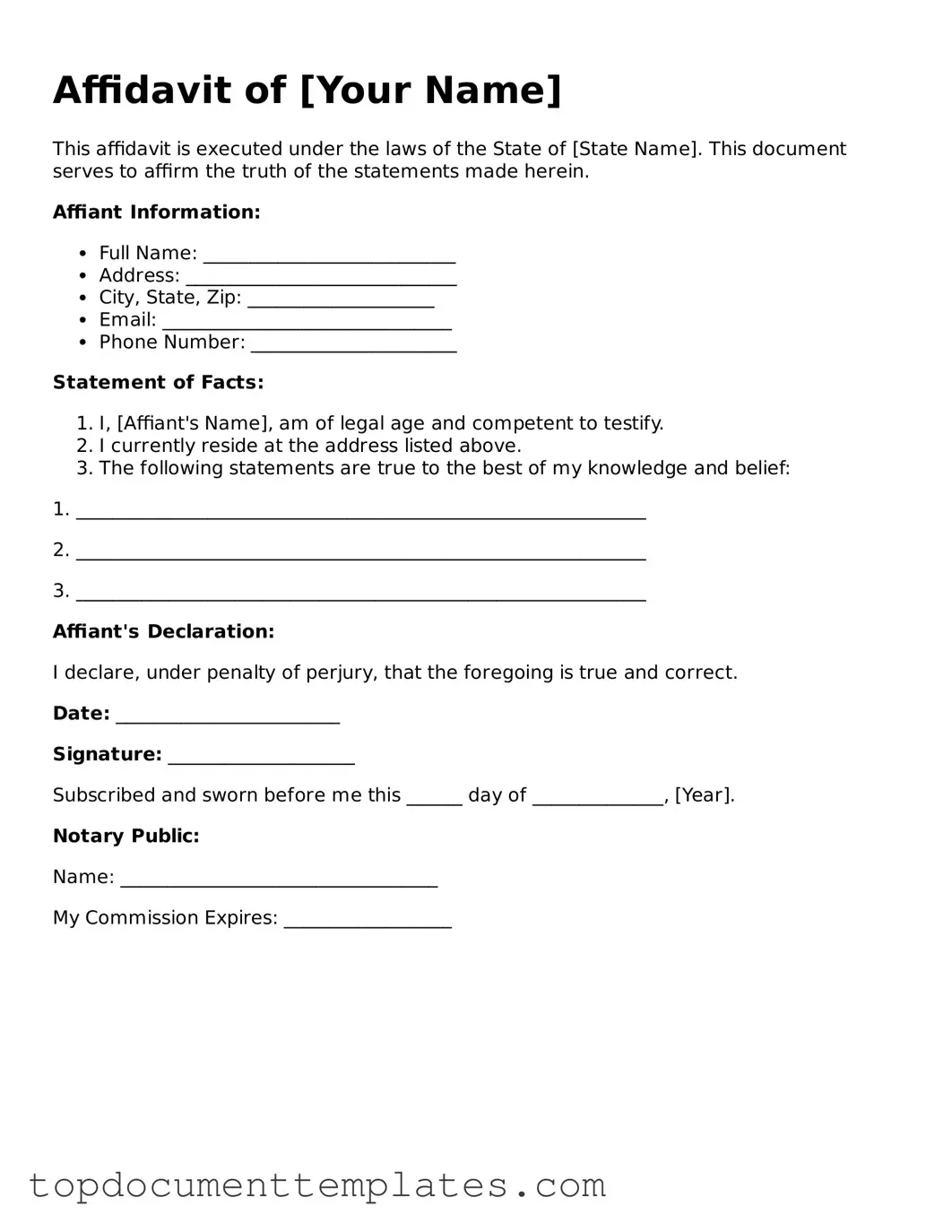Official Affidavit Template
The Affidavit form serves as a crucial tool in the legal landscape, providing a means for individuals to present sworn statements of fact. Often used in various legal proceedings, this document allows a person—known as the affiant—to affirm the truth of the information contained within it under penalty of perjury. The form typically requires the affiant to provide personal details, such as their name, address, and relationship to the matter at hand. Additionally, the affidavit must articulate specific facts that are relevant to the case, ensuring clarity and precision in its assertions. Notably, the document must be signed in the presence of a notary public or another authorized official, which adds a layer of authenticity and legal weight to the statements made. By understanding the structure and purpose of the Affidavit form, individuals can navigate its complexities more effectively, whether they are drafting one for personal use or evaluating one presented in a legal context.
Similar forms
-
Sworn Statement: Like an affidavit, a sworn statement is a written declaration made under oath. It serves to present facts in a legal context, often used in court cases or other legal proceedings.
- Divorce Settlement Agreement: To outline the terms agreed upon during a divorce, utilize the complete Divorce Settlement Agreement form resources for a structured and legally binding approach.
-
Declaration: A declaration is a formal statement that does not require an oath. While it shares similarities with an affidavit in presenting facts, it is often used in situations where an oath is not necessary.
-
Notarized Statement: This document is similar to an affidavit in that it is signed in the presence of a notary public. The notary verifies the identity of the signer, adding an extra layer of authenticity to the document.
-
Witness Statement: A witness statement records a person's account of events. While not made under oath, it can be used in legal settings to support claims, much like an affidavit.
Guidelines on Writing Affidavit
Once you have the Affidavit form ready, you will need to fill it out accurately to ensure it serves its intended purpose. Follow these steps carefully to complete the form.
- Read the Instructions: Begin by reviewing any instructions that accompany the form. This will provide context and guidance on how to fill it out correctly.
- Enter Your Personal Information: Fill in your full name, address, and contact details at the top of the form. Make sure this information is current and accurate.
- State the Facts: In the designated section, clearly and concisely write down the facts you are affirming. Use complete sentences and stick to relevant information.
- Sign the Affidavit: At the end of the form, you will need to sign your name. Ensure that you do this in the presence of a notary public, if required.
- Notarization: If the affidavit requires notarization, take the signed document to a notary public. They will verify your identity and witness your signature.
- Make Copies: After notarization, make copies of the completed affidavit for your records and any parties that may require it.
- Submit the Form: Finally, submit the affidavit to the appropriate entity, whether that be a court, government agency, or another organization.
File Information
| Fact Name | Details |
|---|---|
| Definition | An affidavit is a written statement confirmed by oath or affirmation, used as evidence in court. |
| Purpose | Affidavits are often used to provide evidence in legal proceedings or to verify facts. |
| Components | Typically includes the affiant's name, the statement of facts, and a notary's signature. |
| Notarization | Most states require affidavits to be notarized to ensure authenticity. |
| State-Specific Forms | Each state may have its own affidavit forms, governed by state laws. For example, California's affidavits are governed by the California Evidence Code. |
| Use in Family Law | Affidavits are frequently used in divorce and custody cases to present evidence. |
| Criminal Law Applications | In criminal cases, affidavits can support search warrants or provide evidence for bail hearings. |
| Filing Requirements | Some jurisdictions require affidavits to be filed with the court; check local rules for specifics. |
| Consequences of False Statements | Submitting a false affidavit can lead to legal penalties, including charges of perjury. |
Consider Other Forms
Ucc 1-308 Meaning - Use of the form can aid in protecting individual liberties.
For anyone considering the implications of health and financial decision-making in uncertain times, understanding the Durable Power of Attorney form is essential; it is recommended to consult resources such as OnlineLawDocs.com to ensure that all necessary legal frameworks are properly addressed and maintained.
Partial Lien Release Template - Confirms progress in settling debts associated with construction work.
Free Printable Daycare Receipt - The child care service period should be specified in the form.
